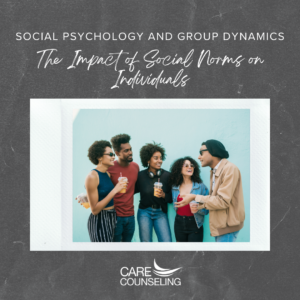Complexities of Social Psychology and Group Dynamics
 Social psychology delves into the fascinating world of human behavior within social contexts. It explores how individuals’ thoughts, feelings, and actions are influenced by their presence and interactions with others. In this blog post, we will embark on a journey into social psychology and group dynamics. We will examine the powerful social influences on behavior and cognition, including topics such as conformity, obedience, groupthink, and the impact of social norms on individuals and collective behavior.
Social psychology delves into the fascinating world of human behavior within social contexts. It explores how individuals’ thoughts, feelings, and actions are influenced by their presence and interactions with others. In this blog post, we will embark on a journey into social psychology and group dynamics. We will examine the powerful social influences on behavior and cognition, including topics such as conformity, obedience, groupthink, and the impact of social norms on individuals and collective behavior.
Humans are inherently social beings, and our behavior is significantly influenced by the presence and expectations of others. Social psychology sheds light on various social influences, such as conformity, obedience, and group dynamics. These phenomena demonstrate the power of social situations to shape individual behavior, thoughts, and decision-making processes.
Conformity: Conformity refers to the tendency to adjust one’s attitudes, beliefs, and behaviors to align with those of a majority or a social group. The desire to fit in and be accepted often leads individuals to conform, even if it contradicts their personal beliefs or judgments.
Obedience: Obedience involves compliance with directives or orders from an authority figure. It explores how individuals may relinquish their autonomy and submit to authority, often resulting in behaviors they would not engage in otherwise.
Groupthink: Groupthink occurs when a group’s desire for consensus and cohesiveness overrides critical thinking and independent decision-making. It can lead to flawed or irrational decision-making, as group members prioritize harmony over the examination of alternative viewpoints.
Social norms, the unwritten rules and expectations within a society or group, play a significant role in shaping individuals’ behavior and collective behavior. Social norms can be explicit or implicit, guiding individuals’ actions and defining what is considered acceptable or unacceptable in a given context.
Compliance with social norms often arises from the desire for social approval, fear of rejection, or the need to maintain group cohesion. Norms can influence various aspects of behavior, such as attitudes, dress codes, language, and ethical standards.
Social norms can have both positive and negative impacts. While they help maintain order and predictability in society, they can also perpetuate harmful practices or hinder individual expression. Understanding the influence of social norms is crucial for promoting positive social change and challenging societal norms that perpetuate inequality or harmful behaviors.
Group dynamics explore how individuals’ behavior, attitudes, and emotions are influenced by being part of a group. Within a group setting, social interaction, power dynamics, and interpersonal relationships shape the collective behavior and decision-making processes.
Influencing Positive Group Dynamics:
– Encouraging diverse perspectives: Embracing diverse viewpoints fosters creativity, innovation, and better decision-making within groups.
– Promoting effective communication: Open and respectful communication allows for the exchange of ideas, reduces misunderstandings, and strengthens relationships within the group.
– Encouraging individual autonomy: Allowing individuals to express their independent thoughts and ideas helps prevent groupthink and encourages critical thinking.
Social psychology and group dynamics provide valuable insights into the social influences on behavior and cognition. From conformity and obedience to the impact of social norms and group dynamics, understanding these concepts helps unravel the complexities of human behavior within social contexts. By studying and comprehending these influences, we gain a deeper understanding of our own actions and those of others. Moreover, this knowledge equips us to challenge societal norms, promote positive group dynamics, and foster environments that encourage independent thinking, creativity, and collective growth.



























